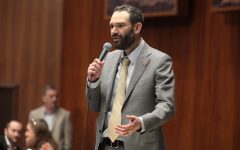
Kari Lake at Rally (Photo: Lake Campaign)
Four Days and Counting: Arizona’s Election Confidence Problem
Officials unable to explain why Arizona always slow to count ballots
By Christy Kelly, November 9, 2024 10:22 am
The Arizona U.S. Senate race between Democrat Ruben Gallego and Republican Kari Lake remains highly competitive, with Maricopa County reporting a narrow 2% margin between the candidates. Vote counting continues, with the gap tightening in the days post-election. Although several pre-election polls indicated a clear lead for Gallego, the current tallies show a much closer race, casting doubt on the reliability of these polls. Kari Lake always insisted that the race was razor close. We now see that she was right.
Observers are voicing concerns about this cycle’s polling inaccuracies, particularly regarding methods and sample demographics that may not have accurately captured Arizona voter sentiments. Some polls, including a New York Times/Siena College survey, showed Gallego ahead by as much as eight percentage points—a projection that implied the race was essentially over for Lake. However, the reality is far different, suggesting a disconnect between predictions and voter behavior in Arizona. Here are some examples of grossly inaccurate polling:
New York Times/Siena College, Oct 25- Nov 2: Gallego +8
ActiVote, Oct 5- 31: Gallego +9
CNN/SSRS, Oct 21-26: Gallego +8
RABA Research, Oct 25-27: Gallego +15
After the Lake/Gallego debate, journalist Ronald Hansen noted, “Overall, Gallego has led the past dozen public polls of likely voters 51%-43% and posted double-digit leads on Lake five times in a span that reaches back to Sept 24.” Hansen continued, asserting, “Taken as a whole, the polling picture continues to point to a Gallego advantage in a race he has largely controlled since March. Gallego, a five-term member of Congress, has led 54 of the 57 polls in that time and every poll since early August.”
Hansen seemed to dismiss polls that were more favorable to Lake, noting that her best polling came from Republican-aligned groups: One July poll pointed to a tie, while a survey by her campaign showed her with a slim 1-point edge. By discounting Lake’s potential, Hansen’s analysis painted a picture many now see as overly confident in Gallego’s favor, downplaying the competitiveness unfolding in real-time vote counts.
As far as Kari Lake is concerned, the new polls saying she’s second in the Arizona U.S. Senate race might as well be hogwash. https://t.co/KsaivPHsIR
— KTAR News 92.3 (@KTAR923) August 30, 2024
While discrepancies between polling data and election results fuel skepticism about pre-election surveys, the true impact of the “errors” remains unclear. Pundits say inaccurate polls can depress turnout, dry up donations, and distort campaign strategies. They claim that when polls suggest a clear frontrunner, potential supporters of trailing candidates may feel discouraged, assuming their votes won’t make a difference, leading to reduced voter engagement. For campaigns, inaccurate polling data may result in misallocated resources, focusing efforts on areas that don’t need as much attention while neglecting key regions in need of support. Inaccurate polls can also shape media narratives, influencing how races are covered and potentially further swaying public perception and donor interest.
How the Political Elites plan to try to stop We the People:
Combine the Fake News Media’s False Narrative with absurdly bogus polls to TRY to make the public forget the misery of life under the Democrats destructive and unpopular dead-end policies.
They want you to ignore…
— Kari Lake (@KariLake) August 8, 2024
As ballot counting continues and both campaigns intently watch developments, Maricopa County will likely determine the race’s outcome. The uncalled Lake/Gallego senate race may offer greater significance than simply determining the strength of Republican senate control. It may highlight the limitations of polling data as a predictive tool, particularly in complex and closely contested environments. It may also serve as a reminder for more cautious interpretation and use of polling, particularly its influence over political competitiveness and the public perception of a race’s importance.
- Nguyen, Petersen Hit Dem Caucus for Iran Stance - March 2, 2026
- Mesnard, Olson Tax Bills to Test Hobbs’ 2026 Veto - January 16, 2026
- Petersen, Montenegro Await SCOTUS ‘Save Women’s Sports’ Outcome - January 13, 2026




